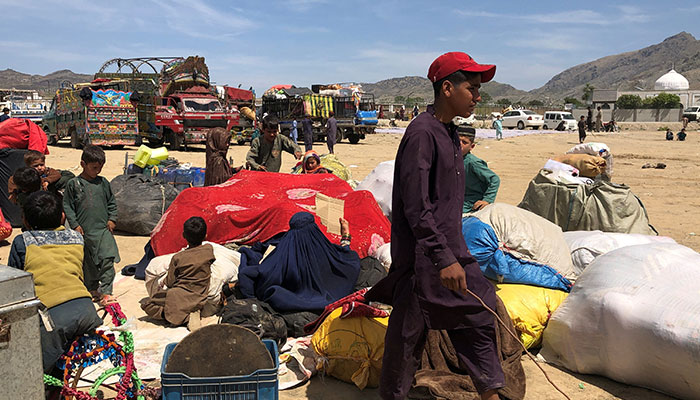ISLAMABAD: Minister of State for Interior Talal Chaudhry on Friday reaffirmed the government’s strict stance on undocumented immigration, declaring April 30 as the final deadline for all foreign nationals without valid visas to leave Pakistan.
“Pakistan has shown unmatched hospitality for decades, but the time has come to strictly enforce our immigration laws,” the minister said while addressing a press conference in Islamabad.
Chaudhry was speaking a day before Deputy Prime Minister and Foreign Minister Ishaq Dar is scheduled to lead a high-powered delegation for talks in Kabul.
Afghan nationals who have no legal documents to stay or those holding Afghan Citizen Cards had been warned by Islamabad to return home or face deportation by March 31, a deadline which was then extended to April 30.
The repatriation drive is part of a campaign called the Illegal Foreigners Repatriation Plan, launched in late 2023.
The country has been hosting millions of Afghans for around five decades. Hundreds of thousands of them returned to their country in the last few years, but over 2.1 million are still living in Khyber Pakhtunkhwa (KP) and other provinces.
Last year was the deadliest year in almost a decade in Pakistan, with more than 1,600 people killed in attacks — nearly half of them security forces personnel — according to the Islamabad-based Centre for Research and Security Studies.
Pakistan accuses the Taliban government of failing to root out militants sheltering on Afghan soil, a charge the Taliban government denies.
The Taliban government has repeatedly called for the “dignified” return of Afghans to their country, with Prime Minister Hassan Akhund urging countries hosting Afghans not to force them out.
“We welcomed our Afghan brothers for 40 years with open hearts. But no country in the world allows anyone to live without a visa, and Pakistan cannot be an exception,” Talal said while speaking to journalists today.
Chaudhry shared that 84,869 Afghan nationals have been repatriated since April 1 as part of the ongoing national policy to return individuals residing in Pakistan illegally.
He clarified that the repatriation process is being conducted in a lawful, organised, and humane manner, and that Pakistani authorities are working closely with Afghan counterparts to facilitate the transition.
A major part of the government’s enforcement strategy focuses on those providing accommodation, employment, or services to undocumented foreigners.
Chaudhry revealed that strict action will be taken against Pakistani citizens who rent out shops, homes, or hotel rooms to illegal immigrants or hire them for jobs.
“We have communicated clear instructions to all provinces. If anyone gives a shop, house, or any kind of space to an illegal foreigner, they will be held accountable under the law,” he said.
He further added that only foreign nationals with valid legal documents are eligible to rent property, open businesses, or seek employment in Pakistan. All dealings, whether in movable or immovable property, must be conducted with legally documented individuals.
“Pakistani citizens are only permitted to work with or rent to those who have proper legal status in the country,” he added.
The minister assured that Pakistan is pursuing a balanced approach that includes diplomatic coordination with the Afghan government.
Chaudhry also raised alarm over credible intelligence suggesting that some of the one million weapons left behind by US forces in Afghanistan have made their way into the hands of terrorist groups.
“These developments confirm our security concerns. The presence of such weapons in the wrong hands poses a serious threat not only to Pakistan but to the entire region,” he cautioned.
The minister concluded by reiterating that Pakistan’s policy is driven not by animosity, but by a commitment to the rule of law, public safety, and national interest.





